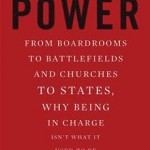Be careful reading this book. You may say un-American things.
For instance, you might think the U.S. Constitution should be changed immediately. That laugh or growl you just heard came from a nearby Tea-Partier.
Moises Naim’s The End of Power: From Boardrooms to Battlefields and Churches to States, Why Being in Charge Isn’t What It Used to Be is worth the read.
He lays out the problems governments, businesses, religions, and political parties are having now – and will have in the future – and some solutions.
Who should read this: someone of working age; someone wondering why things are so difficult to get anything done or to get a job.
 People who won’t like this book: Tea-Partiers described as “simple” and political mafia types; and other extremist groups who fail at compromise.
People who won’t like this book: Tea-Partiers described as “simple” and political mafia types; and other extremist groups who fail at compromise.
My bias revealed: this book says a lot of what I am saying here on this site about the future problems we are not facing: aging demographics; technology; and Third World countries becoming Middle Class.
The Informed Not Inflamed Takes:
- This is actually a very optimistic book. Naim thinks the U.S. will prosper in the 21st Century. Naim believes we will find the solutions we need whereas other countries don’t have our institutions and power.
- Naim believes after some years of debate and chaos we Americans will come together as a nation and find the solutions. I totally agree.
- Still, it is harder to govern and run a company or an organization these days. And it won’t be any easier as we move forward into this new age.
- These problems with power have been growing for decades. The Fall of the Berlin Wall and the end of the Soviet Union are good starting guideposts. All you have to do is look at the log-jam in Congress, the failure of Wall Street, the moral decay of the Catholic Church, and even the problems in major league sports. Don’t forget the troubles the strongest military in the world has had with low-tech fighters in Iraq and Afghanistan or that horrific day September 11, 2001.

- The main cause for the loss of power across the world: more people climbing out of poverty into the Middle Class and the technology available for these once Third World people to compete with us.
- Naim discusses the Revolution in communication technology: the Internet; smart phones; Google; Twitter; and Skype. But he correctly explains that these are only tools for the newly-awakened masses around the world. The Arab Spring may have gotten a boost from a Facebook employee, but it wouldn’t have gone anywhere unless the masses knew there were freedoms and livelihoods available to them that were somehow being denied.
- He has two good solutions. Both are macro solutions – not specific laws. (Imagine a Venezuelan telling America how to re-write the Constitution. Don’t worry, he doesn’t.)
- The first is what he calls our Elevator Thinking. As a country, we Americans – especially the media – must stop talking about the 21st Century being the Century of the Chinese or The Demise of America. He correctly explains that we will still be strong but we will be sharing the world with other players. This, of course, touches on what I call the NFL Bias of the media where we incorrectly put everything into sports analogies because it’s easy.
- The second is that we Americans need to change our institutions. Naim will find a deaf ear from many right-wing extremists who follow a “literalist” or “originalist” view of The Constitution. Naim makes this case by saying we really haven’t had any breakthroughs in government innovation since the 18th Century. Plus, he says our problems today are complex. They will take time and cooperation, not only among Americans also on an international basis. That could mean we need our elected officials in office longer. But it also means we need massive amounts of transparency by our leaders.
- A good book to read along with this is Chris Hayes’ Twilight of the Elites.

Comments on this entry are closed.